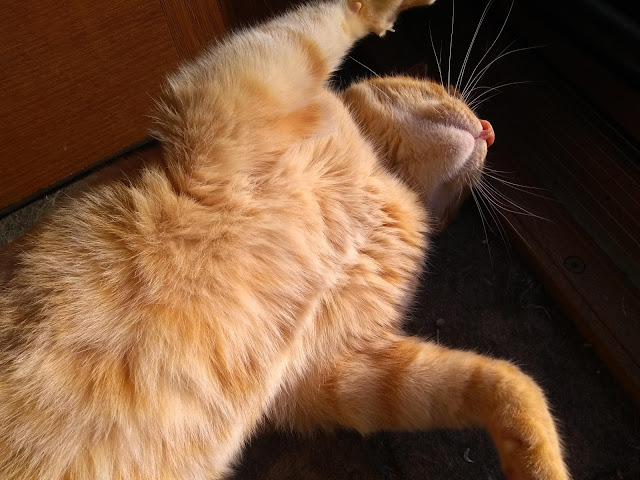To give a recap, for this year's April A to Z Challenge, since I love to write and am working on a series of books, I'm sharing A to Z doodles relating to my stories. Much like my usual doodles and weekly poems, the stories I write are weird, wacky, and star lots of animals. That leads us to today's letter, which is C. So, what does C stand for?
C is for Coral
***
Of course, since it's Mancat Monday, we won't make you go without a certain orange mancat.
Today, we have the last tip in a repeat series of heartworm tips. This is because April is Heartworm Awareness Month. So, the final such tip is below.
Today’s tip is a long one, and it relates to a fact that especially all cat parents really should know. And this is that there is currently no true treatment for heartworms in cats. There are treatments available for dogs that can kill the adult heartworms, but this does not work the same for cats. One reason for this is that the drug used to treat heartworms in dogs has been found, in some cases, to cause sudden death in cats. This is often due to dead or dying heartworms causing blockages and cardiac failure. Another reason why treatments may not work is because the life cycle of a heartworm is different in a dog versus a cat.
In dogs, the lifespan of a heartworm is longer, around five to seven years. This lifespan includes larvae entering the body after a mosquito bite, traveling to the heart, and then growing into mature, reproducing adults. Dogs are an optimal host for heartworms.
In cats, the heartworm lifespan is far shorter, often two to three years. What’s more, cats are not a prime host for heartworms, and a cat’s body itself often overcomes the heartworms, typically before they can even enter into adulthood. This is why far less adult heartworms are found in cats than are found in dogs. Even immature heartworms, which are typically what would circulate in the blood and be indicative of disease in a canine heartworm test, are often not found in the blood of cats. This is why cats are less commonly diagnosed with heartworm disease. Then again, though, it is not impossible for a cat to have heartworm disease, and in this case, heartworms cannot be killed as they can in dogs.
For cats, one of the only options for a cure is to have the heartworms surgically removed. This, of course, can be tricky and risky. Symptoms of the disease can also perhaps be controlled and the cat made comfortable with various medications and supportive treatments. Given that a cat might be able to outlive the heartworms, it is possible to treat the symptoms while the heartworms go through their cycle and ultimately die. As mentioned earlier, though, heartworms can live for two to three years in a cat, and there is still always the risk of pulmonary or cardiac failure while the heartworms remain.
With such limited treatment options for heartworms in cats, it is incredibly important to again note that the best option is to keep your cats on heartworm prevention. The risk of heartworm disease might seem small, but it is a risk nonetheless. And, just as always, it is better to be safe than sorry.
And, there is one last note for pup parents. Though there is a more successful heartworm treatment for dogs, heartworm disease can cause permanent damage. This can lead to lifelong issues, such as of the heart and lungs, even after the heartworms are eradicated. For this reason, heartworm prevention is of course also recommended for dogs.






4 comments:
Evan, without a care in the world!
Look at that tummy!!! Pierre is adorable. I love goats!
Evan is too cute for words! I love belly photos. Your drawing is wonderful too. I can imagine that Coral and Pierre have a lot of great times together in your stories. Thank you for the reminder about heartworm too! So important to keep your kitties protected from those parasites.
Coral and Pierre, i am sure they're quite the pair.
Evan, thank you, i needed that ray of sunshine.
Post a Comment